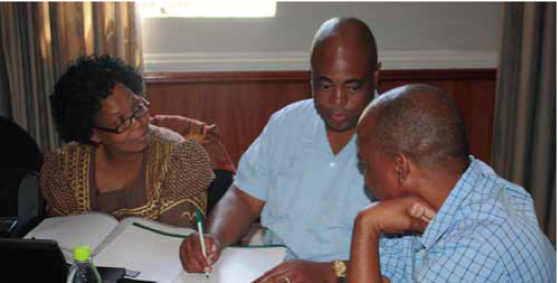All systems go with the new curriculum

Photo caption: From left: Masego Tlhabane, Bully Monyaki and Hendric Moeletsi during the Department of Basic Education’s orientation of provincial and district subject advisers on the changes that will be introduced to strengthen the implementation of the Curriculum and Assessment Policy Statement in schools.
Heading
The Curriculum and Assessment Policy Statement (CAPS) for the Intermediate Phase and Grade 11 will be introduced in 2013. The Department of Basic Education (DBE) is, therefore, orientating hundreds of subject advisors on the changes to ensure smooth implementation of the new curriculum.
Following the introduction of CAPS in the Foundation Phase and Grade 10 this year, preparations are progressing swiftly to ensure that the introduction of the second phase goes smoothly in 2013. The DBE has gathered subject advisers for the Intermediate Phase from across South Africa in Johannesburg for the orientation programme.
These advisers will then advise teachers on the content, assessment, teaching methodology, resources and management of classrooms in CAPS in their own districts.
Inducting advisers training teachers
More than 1 000 Intermediate Phase subject advisers, from all nine provinces, are orientated in this process, which is scheduled to last for four weeks.
Provinces have been clustered into groups of three to ensure that training runs smoothly and that enough time is spent on practical application of what the changes will mean to teachers in the classroom. The training is held over 5 days per week.
The DBE has developed a manual and re- source pack for each subject adviser for training teachers. “There will be one orientation manual for each subject, which the subject advisers will use for training and pass on to teachers in their districts,” said Ms Jenny Kinnear, director: Schools Curriculum, General Education and Training.
“We are trying to avoid dilution of the message to teachers on the requirements of CAPS and we want to ensure that the same policies and materials are used in all schools. There will be no localisation of these manuals.”
“In this way, principals and school management teams will receive the same information on CAPS to strengthen the management of CAPS. In fact, all stakeholders involved in the training and support of teachers will have the same manual and requirements that will be used to implement CAPS effectively.”
At the same time, DBE Further education and Training subject advisers are orientating their provincial and district subject advisers for all subjects in Grade 11. By the end of their three-week orientation, they would have orientated close to 2 100 officials across all provinces.
All teachers trained before 2013
For the first time, the DBE has experienced high levels of confidence and commitment from provincial and district officials as they prepare to support teachers.
The Department of Basic Education aims to have every Intermediate Phase teacher in the country trained and prepared for the introduction of CAPS before 2013. In the light of this, the DBE will be sending out monitoring teams to ensure that training takes place at a district level and inputs from these visits will be used to further strengthen training for the introduction of CAPS in the Senior Phase, which is scheduled for 2014.
For more information, call the Department of Basic Education: 012 357 3000



 Facebook
Facebook Twitter
Twitter WhatsApp
WhatsApp